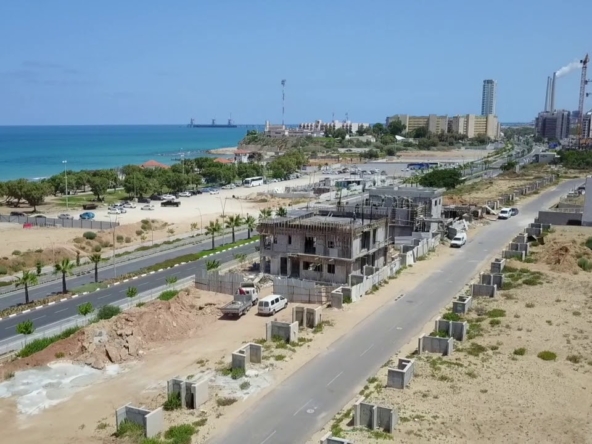Real Estate and Economic Growth in Israel: A Comprehensive Overview for 2025
1. New Constructions and Housing Developments in 2025
a. New Constructions:
In 2025, Israel is expected to continue its rapid expansion in the real estate sector, reflecting the ongoing strong demand for new housing. The projected number of new housing units for the year is between 60,000 and 65,000.
- Total Construction Volume: approximately 60,000 to 65,000 new housing units.
- Estimated Cost: approximately 22 billion shekels (about 6 billion dollars).
b. Geographic Distribution:
- Tel Aviv: 13,000 new housing units, with major projects such as the development of the Tel Aviv port area and the expansion of the Ramat Aviv neighborhood.
- Jerusalem: 11,000 new housing units, focusing on projects such as the “Jerusalem Innovation District” and a new expansion in Gilo.
- Haifa: 8,500 new housing units, including projects in the “Haifa Industrial Zone” and the “Haifa Waterfront” project.
- Beer-Sheva: 8,000 new housing units, with major projects like “Beer Sheva South” and additional developments in the “Negev Technology City.”
- Modiin: 7,000 new housing units as part of the “Modiin West” project.
- Ashdod: 4,500 new housing units, notably the “Expansion of Ashdod Port” project.
2. Future Development Projects
a. Tel Aviv
- “Tel Aviv Port Redevelopment” Project:
- Description: Transformation of the Tel Aviv port area into a mixed-use development with 13,000 housing units, 150,000 square meters of office space, and extensive retail and entertainment facilities.
- Budget: Approximately 9 billion shekels (about 2.5 billion dollars).
- Start Date: Early 2025, with a development timeline of 6 years.
- “Ramat Aviv Extension” Project:
- Description: Addition of 7,000 housing units, new shopping centers, and public amenities in the Ramat Aviv neighborhood.
- Budget: Approximately 5 billion shekels (about 1.37 billion dollars).
- Start Date: Mid-2025, with a construction period of 5 years.
b. Jerusalem
- “Jerusalem Innovation District” Project:
- Description: Creation of a technology and research hub including 8,000 new housing units, 100,000 square meters of office space, and innovation laboratories.
- Budget: Approximately 7 billion shekels (about 1.9 billion dollars).
- Start Date: Early 2025, with a development phase of 5 years.
- “Gilo Expansion”:
- Description: Extension of 3,000 housing units, development of new schools, and infrastructure improvements in the Gilo neighborhood.
- Budget: Approximately 3 billion shekels (about 825 million dollars).
- Start Date: Late 2025, with a construction phase of 4 years.
c. Haifa
- “Haifa Industrial Zone” Project:
- Description: Development of 7,000 housing units, 50,000 square meters of industrial space, and logistics centers.
- Budget: Approximately 6 billion shekels (about 1.65 billion dollars).
- Start Date: Early 2025, with a planned development period of 5 years.
- “Haifa Waterfront”:
- Description: Revitalization of the Haifa waterfront with 1,500 new housing units, a marina, and extensive recreational areas.
- Budget: Approximately 4 billion shekels (about 1.1 billion dollars).
- Start Date: Mid-2025, with a development timeline of 4 years.
d. Beer-Sheva
- “Beer Sheva South” Project:
- Description: Construction of 8,000 housing units, 25,000 square meters of commercial space, and a new park.
- Budget: Approximately 5.5 billion shekels (about 1.5 billion dollars).
- Start Date: Early 2025, with a development phase of 4 years.
- “Negev Tech City”:
- Description: Creation of a technology park with 3,000 housing units, research facilities, and offices.
- Budget: Approximately 4 billion shekels (about 1.1 billion dollars).
- Start Date: Mid-2025, with a construction period of 5 years.
e. Modiin
- “Modiin West” Project:
- Description: Addition of 7,000 housing units, new shopping centers, and community facilities.
- Budget: Approximately 4.5 billion shekels (about 1.24 billion dollars).
- Start Date: Early 2025, with a development timeline of 4 years.
f. Ashdod
- “Expansion of Ashdod Port” Project:
- Description: Expansion of Ashdod Port with new docks and increased capacity, alongside the development of 3,000 new housing units.
- Budget: Approximately 5 billion shekels (about 1.37 billion dollars).
- Start Date: Mid-2025, with a planned development period of 5 years.
3. Immigration and Demographic Growth
a. New Immigrants:
- Number of Immigrants: In 2025, Israel is expected to welcome approximately 40,000 to 45,000 new immigrants, with a significant number coming from countries such as Russia, Ukraine, and France.
- Distribution: The majority of new immigrants will settle in Tel Aviv, Jerusalem, and Beer-Sheva.
b. Demographic Growth:
- Total Population: The population of Israel is expected to reach approximately 9.7 million in 2025, representing an increase of about 2% from the previous year.
- Birth Rate: The average birth rate remains high, at about 3 children per woman.
4. Economic Growth
a. GDP Growth:
- Growth Rate: Israel is expected to continue its strong economic growth, with GDP projected to increase by 3.7% to 4.2% in 2025.
- Key Sectors: The technology sector, tourism, and renewable energies remain the main drivers of growth, highlighting Israel’s position as a hub of innovation and economic dynamism.
b. Child Growth Rate:
- Birth Rate: The high birth rate of about 3 children per woman plays a crucial role in stimulating demand for housing and infrastructure.
Conclusion
The real estate and economic sectors of Israel continue to demonstrate exceptional dynamism and growth. The anticipated increase in new constructions and ongoing development projects reflects the vibrancy and evolution of the country’s real estate market. Compared to other countries, the Israeli real estate sector shows a remarkable rate of expansion and a consistent upward trajectory, highlighting its robust economic health and commitment to infrastructure development.
The wide range of new projects, combined with high immigration figures and impressive economic growth, positions Israel as a global leader in real estate development and economic innovation.
This detailed report provides an in-depth overview of real estate and economic trends in Israel for 2025, offering valuable insights to international observers and stakeholders.


